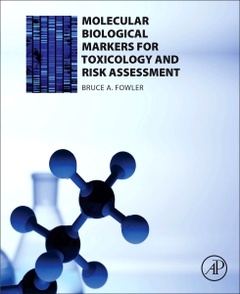Description
Molecular Biological Markers for Toxicology and Risk Assessment
Author: Fowler Bruce A.
Language: English
Subjects for Molecular Biological Markers for Toxicology and Risk...:
Support: Print on demand
Description
/li>Contents
/li>Readership
/li>Biography
/li>Comment
/li>
Molecular Biological Markers for Toxicology and Risk Assessment provides an introduction to the exciting field of biomarkers and their use in toxicology and risk assessment. In recent years, new classes of molecular biomarkers capable of detecting early manifestations of ongoing chemical-induced cell injury and cell death have been developed as a result of advances in analytical chemistry, molecular biology, and computational modeling. The interplay between these emergent tools of science has resulted in new insights into initial mechanisms of chemical-induced toxicity and carcinogenicity.
Molecular Biological Markers for Toxicology and Risk Assessment guides the reader through a broad range of molecular biological markers, including the "omic" biomarkers, and provides an examination of the various elements in the evolution of these modern tools. It then explores possible ways in which these markers may be applied to advance the field of chemical risk assessment. Since molecular biomarkers and related technologies are inherently complex, the book concludes with a section on risk communication in order that readers may appreciate both the strengths and limitations of molecular biological marker approaches to risk assessment practice.
Professional toxicologists, risk assessors, and regulators
- Introduces the use of molecular biomarkers to detect toxic effects of chemicals as early as possible
- Provides an accessible overview of this emerging, interdisciplinary field, to best inform decision making in chemical and pharmaceutical safety
- Includes a section on risk communication of these complex concepts, essential for effective risk assessment
- Provides new insights into the initial mechanisms of chemical-induced toxicity and carcinogenicity
These books may interest you

Mammalian Toxicology 112.17 €



